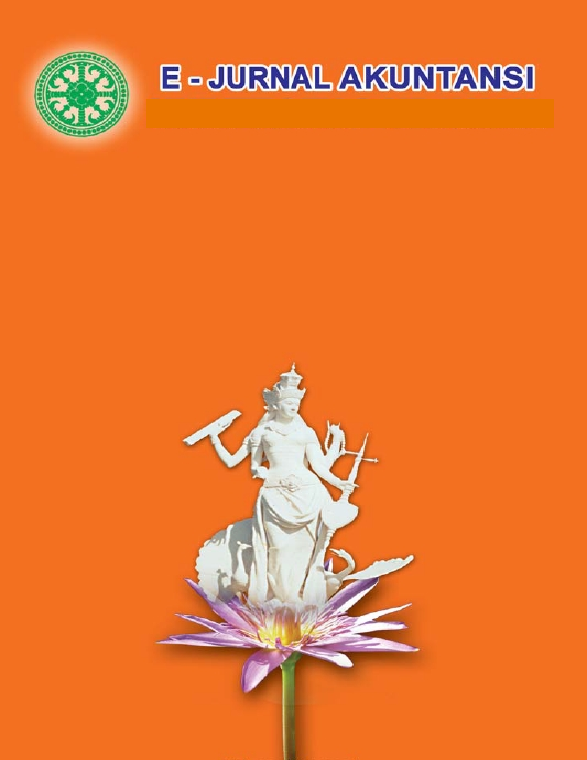Nilai Moral Figur Putri Mandalika dalam Profesi Akuntan
Abstract
This study departs from the legendary story of Princess Mandalika which is the basis for the moral values of the figure of the Princess Mandalika seen in the accounting profession, especially women. The moral value consists of the value of sacrifice and the value of emancipation. This research uses a phenomenological approach. Data collection techniques using semi-structured interview techniques. The informants who are the object of research are the Culture and Professional Practitioners of Accountants. The results of this study indicate that the value of sacrifice and the value of the emancipation of the figure of Princess Mandalika are still alive in the accounting profession, especially women.
Keywords: Sacrifice Value; Emancipation Value; Putri Mandalika; Professional Accountant.
Downloads
References
Alvesson, M., & Billing, Y. D. (1997). Understanding Gender and Organization (1st ed.). SAGE.
Ariefa, N. A., & Mutiawanthi. (2018). Perempuan Pada Cerita Rakyat Jepang dan Indonesia: Analisis Komparatif dengan Pendekatan Feminisme. Jurnal Al-Azhar Indonesia Seri Humaniora, 4(3), 150–160.
Burrell, G., & Morgan, G. (1979). Sociological paradigms and organizational analysis. London: Heineman.
Collins, A., & Schultz, N. (1995). A Critical Examination of the AICPA Code of Professional Conduct. Journal of Business Ethics, 14(1), 31–41.
Duska, R. F. (2011). Accounting Ethics. Wiley Blackwell.
Flynn, A., Earlie, E. K., & Cross, C. (2015). Gender equality in the accounting profession : one size fits all. Gender in Management: An International Journal, 30(6), 479–499.
Hartono, S., & Faozaeni, E. (2018). Mandalika Punya Kita. Exotica Senggigi.
Haynes, K. (2008). Transforming identities : Accounting professionals and the transition to motherhood. Critical Perspectives on Accounting, 19(5), 620–642.
Haynes, K. (2016). Accounting as gendering and gendered : A review of 25 years of critical accounting research on gender. Critical Perspectives on Accounting. Retrieved from http://dx.doi.org/10.1016/j.cpa.2016.06.004
Kant, I., & Schneewind, J. B. (2002). Groundwork for the Metaphysics of Morals. Yale University Press.
Komalasari, Y., Wirajaya, I. G. A., & Sari, M. M. R. (2019). Akuntabilitas Akuntan Perempuan-Karir Bali: Sebuah Studi Fenomenologi. Jurnal Ilmiah Akuntansi Dan Bisnis, 14(1), 70–85.
Megawangi, R. (1999). Membiarkan berbeda?: Sudut pandang baru tentang relasi gender. Mizan.
Moizer, P. (1995). An ethical approach to the choices faced by auditors. Critical Perspectives on Accounting, 6, 415–431.
Montenegro, T. M., & Bras, F. A. (2015). Audit quality: does gender composition of audit firms matter? Spanish Journal of Finance and Accounting, 44(July), 264–297.
Oakley, A. (1985). Sex, Gender and Society. Ashgate Publishing Limited.
Preuss, L. (1998). On ethical theory in auditing. Managerial Auditing Journal, 13(9), 500–508.
Purna, I. M. (2018). Bau Nyale : Tradisi Bernilai Multikulturalisme dan Pluralisme. Patanjala, 10, 99–114.
Puspitaningtyas, Z. (2013). Perempuan dalam perspektif akuntansi syariah. Jurnal Ilmu Ekonomi Dan Sosial, 2, 206–214.
Rosnilawati. (2016). Studi Komparatif Struktur Cerita Legenda La Hila (Bima) dan Legenda Putri Mandalika (Lombok). Universitas Mataram.
Sasangka, S. S. T. W. (2002). Putri Denda Mandalika. Jakarta: Pusat Bahasa.
Whiting, R. H., & Wright, C. (2001). Explaining gender inequity in the New Zealand accounting profession. British Accounting Review, 33(March 2000), 191–222.

This work is licensed under a Creative Commons Attribution-ShareAlike 4.0 International License.

















